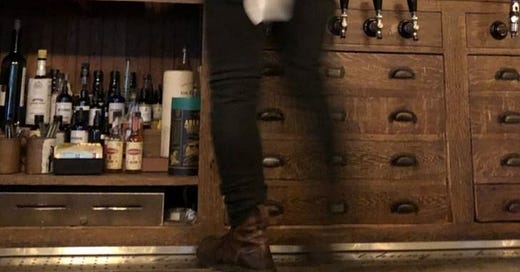What If I Never Learn To Speak Spanish And People Laugh At Me When I Try?
Part 4 in a series about worries: Concerns around moving to Spain
Here’a a rundown of what we’ve done so far in our series on concerns around moving to Spain. In case you need to catch up.
Technically, today’s installment is part four. So you received a bonus in there.
We’ll round things out by getting into the exciting work/career transition my wife will embark on when we move. It’s something I can’t speak to in quite the way she can. I think her story will resonate with more than a few readers, who are making professional and other lifestyle changes at or around middle age and at home or—maybe—abroad.
Before we get to that, we’ll expand on yesterday’s installment on the death of traditional retirement by illustrating exactly what a low cost of living means to me and why/how it matters no matter where you live, but especially if you’re moving to a less expensive country.
But first—
All of this stuff matters—
But, arguably, nothing matters more than the aforementioned work-related transition and my biggest challenge—learning Spanish.
If you have ever learned another language, I’d love to hear what you think is most important. If you grew up around one or more languages and, now, speak one or more languages fluently (or well enough) or have lost proficiency somewhere along the way—same.
This is all super helpful as I gain confidence in my Spanish language learning journey.
Here’s what I am doing to learn—
Twice-a-week, roughly 90-minute lessons with a live Spanish tutor, who gives me homework. (At the end of today’s post I will include some of this week’s homework so you can have some fun with it).
Lots of reading, watching television and doing conjugation and other drills/quizzes on apps.
Reading about the structure, the mechanics of the language.
Translating nearly every thought or interaction I have in English into Spanish, in my head, out loud or on paper.
Talking to my wife, whose first language is Spanish, as much as possible in Spanish.
Doing likewise when out and about in Los Angeles.
The last two points are the toughest.
While we have gotten better lately, it’s so much easier to default to English. However, as my skills grow, we speak more Spanish. So it gets easier to speak Spanish with one another more.
I can be uncomfortable about attempting Spanish in a place where I am pretty much expected to speak English. I am much more comfortable speaking Spanish in Spain, in part because it’s expected. Even though there are lots of Spanish speakers in Los Angeles, most tend to speak English well enough to default to it in places such as the grocery store.
I feel like I am advancing to the point where I will move up by at least a level or two come the end of the year. Then, I hope to make even more progress, via immersion, in 2025 while living in Spain.
I am confident about this trajectory in part because I can feel the light bulbs going off. And it feels like one big light bulb of a bunch of stuff coming together is about to go off.
My tutor continues to add new material, particularly on verb usage and other language structures. Initially, I was concerned that he was adding new material before I mastered—or have even come close to mastering—current material. But he eased those concerns, noting that being exposed to different elements and getting a decent grasp on them allows for the development of building blocks and subsequent breakthroughs.
It’s the way you learn. By adding on material and seeing how it all relates. How it connects. If you understand the simple past tense, it’s easier to understand the differences between, say, the imperfect progressive and perfect past. I can see how it all comes together.
I have a decent conceptual handle on how the different tenses function and when/why to use them. But it’s difficult on the spot or on the ground to know—instinctively—when and why to use them. That’s the process I see moving in a positive direction, aided by everything I’m doing, but, specifically the exercise included below, where I write, make mistakes and save them so we can correct them together.
I don’t want to be, nor will I be one of these American immigrants who moves to another country and expects to be able to speak English. If I don’t learn the language well enough—and then some over time—I will consider that element of the move a major failure.
And it’s a huge element of the move, so …
For one of this week’s homework assignments, I was asked to answer the query in bold—in writing—without checking myself.
In case you don’t know, I used to work in a bar. While my answer isn’t directly related to tending bar, it’s one of the funniest things that happened during my time at the bar.
Anécdotas.
Escribir la experiencia más extraña/ divertida que has tenido en el bar.
Yo ordené un album de Taylor Swift para mi hija. No estoy seguro por que, pero yo pregunté a Amazon mandarlo a mi trabajo.
Una mañana mi compañero de trabajo y yo preparaba abrir el bar mientras escuchaba a música. La canción de Supertramp was playing. Mi compañero de trabajo dije: el album de esta canción es super bueno, Desayuno en America. Estoy de aquerdé con el.
Más tarde, mi pedido llegó. Cuando lo abre no podía creer lo que veía. La album no era Taylor Swift. ¡Era Desayuno en America desde Supertramp! Amazon comité un error. ¡Que un coincidencia rara!









Well wow, I could identify with that. Especially Supertramp.
So I grew up speaking two languages. I learnt German dialect by being a lot here in Switzerland with my grandparents. That was not very useful when I tried to write proper German. I was only really so, so at German in high school. Then at university I was a bit better.
But my grammar has always been weak because of my unstructured start with dialect.
So my approach here in Switzerland is I’ll talk to anybody in the local dialect or in high German and for the most part they can’t really tell that I’m not 100% Swiss. But I pretty much never write in German. I write in English and tell people I think they should be excused having to deal with my poor German grammar.
So I think this gets me to know where you want to set the boundary. And also to the fact that the amount you want to learn is for you. What you’re doing in Spanish Rocco and what I’m doing doing a little bit learning on Duolingo is enough that you can engage when you’re there or you can read things and just make better relationships. that also helps get past the whole thing.
My dad's family came to America as German-speaking French citizens. I took German in college and spent a year studying at Philipps Universität in Marburg. Now, 35 years later, I still attempt to maintain my basic speaking skills with Duolingo and other tools. I just spent 10 days in Munich for a trade show and then some personal time into Innsbruck/Feldkirch/Zurich and my experience was that people were delighted that I was willing to try to speak in German to them. I know my grammar isn't perfect, but that doesn't matter. If I couldn't find the word, I'd either lapse back into English or ask them how to say it. I believe just the willingness to try will take you far once you get there. So have a drink or two to lose your inhibitions and just speak it. Y lo siento para hablo solo un poco Espanol.